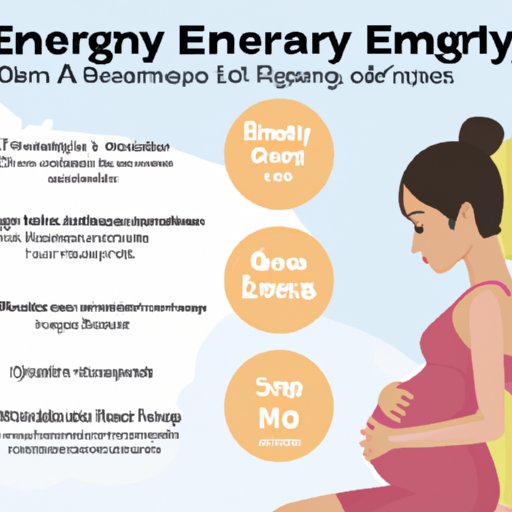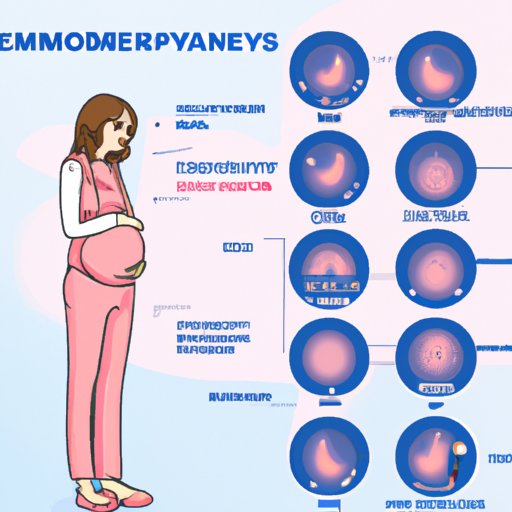Introduction
Pregnancy is an exciting time for expectant parents, but it can also bring a lot of uncertainty and questions. One of the most common questions is: How soon can I feel pregnancy symptoms? Knowing what to expect during your pregnancy can help you prepare and make informed decisions throughout your journey.
In this article, we’ll explore the timeline of pregnancy symptoms, the most common early pregnancy symptoms, and experiences from real moms on how soon they felt those symptoms.
A Timeline of Pregnancy Symptoms: How Soon Can You Expect to Feel Them?
Pregnancy is divided into three distinct stages—the first trimester, second trimester, and third trimester. Each stage has its own set of physical and emotional changes that you may experience.
During the first trimester, which typically lasts from weeks 1 to 13, your body is undergoing rapid changes as your baby develops. The hormones produced by your body during this time can cause a variety of physical and emotional symptoms. Common symptoms during the first trimester include nausea, fatigue, breast tenderness, food cravings, and increased urination.
The second trimester, which lasts from weeks 14 to 27, is when most pregnant women feel the best. Many of the unpleasant symptoms of the first trimester will start to subside, and you’ll likely have more energy. During this time, you may experience skin changes, such as darkening of the areolas or linea nigra, and an increase in breast size as your body prepares for breastfeeding.
The third trimester, which lasts from weeks 28 to 40, is when your body is preparing for labor and delivery. You may experience more physical discomforts, such as backache, shortness of breath, and swelling. You may also feel more emotional, with mood swings and anxiety about the upcoming birth.
Knowing the timeline of pregnancy symptoms can help you understand what to expect during each stage of your pregnancy and be better prepared for the changes ahead.

A Comprehensive Guide to Early Pregnancy Symptoms: What to Expect and When
It’s important to note that everyone’s pregnancy is unique, and the timing and intensity of symptoms can vary from woman to woman. It’s also possible to experience different symptoms at different times throughout your pregnancy.
Here’s a comprehensive guide to the most common early pregnancy symptoms and when you can expect to begin feeling them.
Nausea
Nausea, often referred to as “morning sickness,” is one of the most common early pregnancy symptoms. It usually starts around week 6 and can last up to week 16. Nausea can range from mild to severe, and some women may even experience vomiting.
Tiredness
Fatigue is another common symptom of early pregnancy. It usually starts around week 6 and can last until the end of the first trimester. Fatigue can range from mild to extreme, so it’s important to get plenty of rest and take care of yourself.
Breast Tenderness
Sore breasts are a very common symptom of early pregnancy. Breast tenderness usually begins around week 4 and can last until the end of the first trimester. The soreness may be mild to severe, depending on the individual.
Cravings
Food cravings are a common symptom of early pregnancy. Cravings can start as early as week 4 and can last until the end of the first trimester. It’s important to remember to eat a balanced diet and not to overindulge in unhealthy foods.
Increased Urination
Frequent urination is a common symptom of early pregnancy. It usually starts around week 6 and can last until the end of the first trimester. It’s important to stay hydrated and to avoid drinking too much caffeine.
Morning Sickness
Morning sickness is a common symptom of early pregnancy. It usually starts around week 6 and can last until the end of the first trimester. Morning sickness can range from mild to severe, and some women may even experience vomiting.
Mood Swings
Mood swings are a common symptom of early pregnancy. They usually start around week 8 and can last until the end of the first trimester. Mood swings can range from mild to severe, and it’s important to take time to relax and take care of yourself.
Exploring the Most Common Early Pregnancy Symptoms: How Soon Can They Appear?
Now that we’ve explored the most common early pregnancy symptoms and when you can expect to begin feeling them, let’s dive deeper into how soon you can expect to feel these symptoms.
Nausea
Nausea is one of the earliest signs of pregnancy and can start as early as week 4. Nausea can range from mild to severe, and some women may even experience vomiting.
Breast Tenderness
Breast tenderness is another common symptom of early pregnancy and can start as early as week 4. The soreness may be mild to severe, depending on the individual.
Fatigue
Fatigue is another common symptom of early pregnancy and can start as early as week 4. Fatigue can range from mild to extreme, so it’s important to get plenty of rest and take care of yourself.
Food Aversions
Food aversions are a common symptom of early pregnancy and can start as early as week 4. It’s important to listen to your body and eat a balanced diet.
Early Pregnancy Symptoms: What to Look Out For and When
It’s important to be aware of any changes in your body during pregnancy. While some of these changes are normal, there are certain symptoms that should be monitored closely.
Spotting or Bleeding
Spotting or bleeding can be a sign of miscarriage or ectopic pregnancy and should be monitored closely. If you experience spotting or bleeding, contact your healthcare provider immediately.
Cramping
Cramping can be a sign of miscarriage or ectopic pregnancy and should be monitored closely. If you experience cramping, contact your healthcare provider immediately.
Backache
Backache can be a sign of preterm labor and should be monitored closely. If you experience backache, contact your healthcare provider immediately.
Headaches
Headaches can be a sign of preeclampsia and should be monitored closely. If you experience headaches, contact your healthcare provider immediately.
The First Trimester of Pregnancy: What Symptoms Can You Expect and How Soon?
The first trimester of pregnancy is an exciting time, but it can also bring a lot of physical and emotional changes. Here’s a look at some of the most common symptoms of the first trimester and when you can expect to feel them.
Changes in Appetite
Changes in appetite are a common symptom of early pregnancy and can start as early as week 4. It’s important to listen to your body and eat a balanced diet.
Weight Gain
Weight gain is a common symptom of early pregnancy and can start as early as week 6. It’s important to maintain a healthy weight during pregnancy.
Frequent Urination
Frequent urination is a common symptom of early pregnancy and can start as early as week 6. It’s important to stay hydrated and to avoid drinking too much caffeine.
Constipation
Constipation is a common symptom of early pregnancy and can start as early as week 6. It’s important to eat a high-fiber diet and drink plenty of water.

An Overview of Early Pregnancy Symptoms and How Quickly They May Occur
Now that we’ve explored the timeline of pregnancy symptoms and the most common early pregnancy symptoms, let’s take a look at an overview of how quickly these symptoms can occur.
Nausea, fatigue, cravings, and breast tenderness can start as early as week 4. Spotting or bleeding, cramping, backache, and headaches should be monitored closely and should be reported to your healthcare provider immediately if they occur.
Changes in appetite, weight gain, and frequent urination can start as early as week 6. Constipation can start as early as week 8.
Experiences from Real Moms: How Soon Did They Feel Pregnancy Symptoms?
Every woman’s pregnancy is unique, and the timing and intensity of symptoms can vary from woman to woman. To get a better understanding of how soon pregnant women can expect to feel pregnancy symptoms, let’s take a look at some real-life experiences from moms.
One mom experienced morning sickness as early as week 4, while another didn’t experience it until week 6. One mom experienced breast tenderness as early as week 4, while another didn’t experience it until week 10. One mom experienced fatigue as early as week 4, while another didn’t experience it until week 8.
These experiences show that every woman’s pregnancy is unique, and the timing and intensity of symptoms can vary from woman to woman.
Conclusion
Pregnancy is an exciting time for expectant parents, but it can also bring a lot of uncertainty and questions. In this article, we explored the timeline of pregnancy symptoms, the most common early pregnancy symptoms, and experiences from real moms on how soon they felt those symptoms.
It’s important to remember that everyone’s pregnancy is unique, and the timing and intensity of symptoms can vary from woman to woman. It’s also important to be aware of any changes in your body during pregnancy and to contact your healthcare provider immediately if you experience any concerning symptoms.
(Note: Is this article not meeting your expectations? Do you have knowledge or insights to share? Unlock new opportunities and expand your reach by joining our authors team. Click Registration to join us and share your expertise with our readers.)
